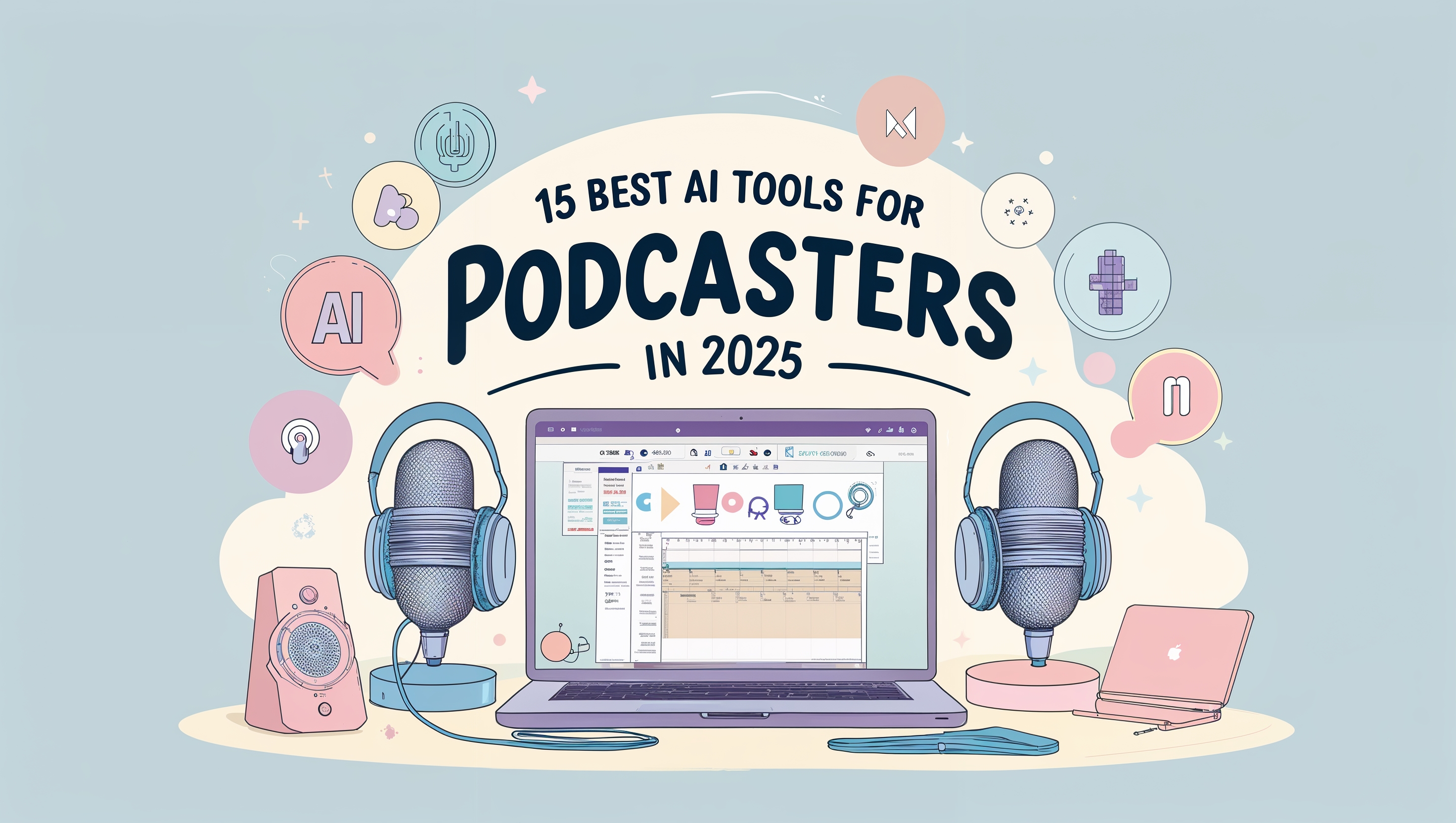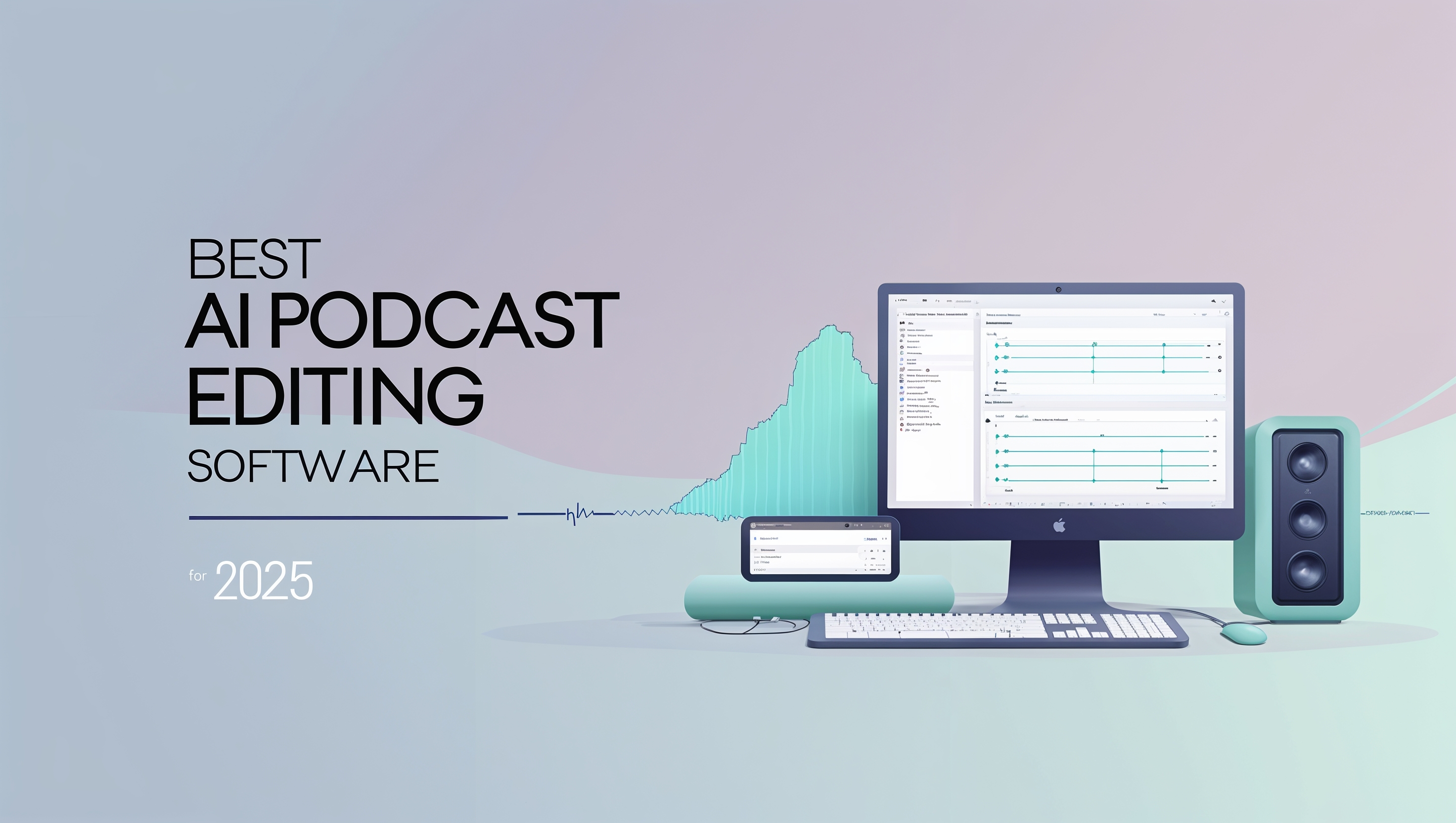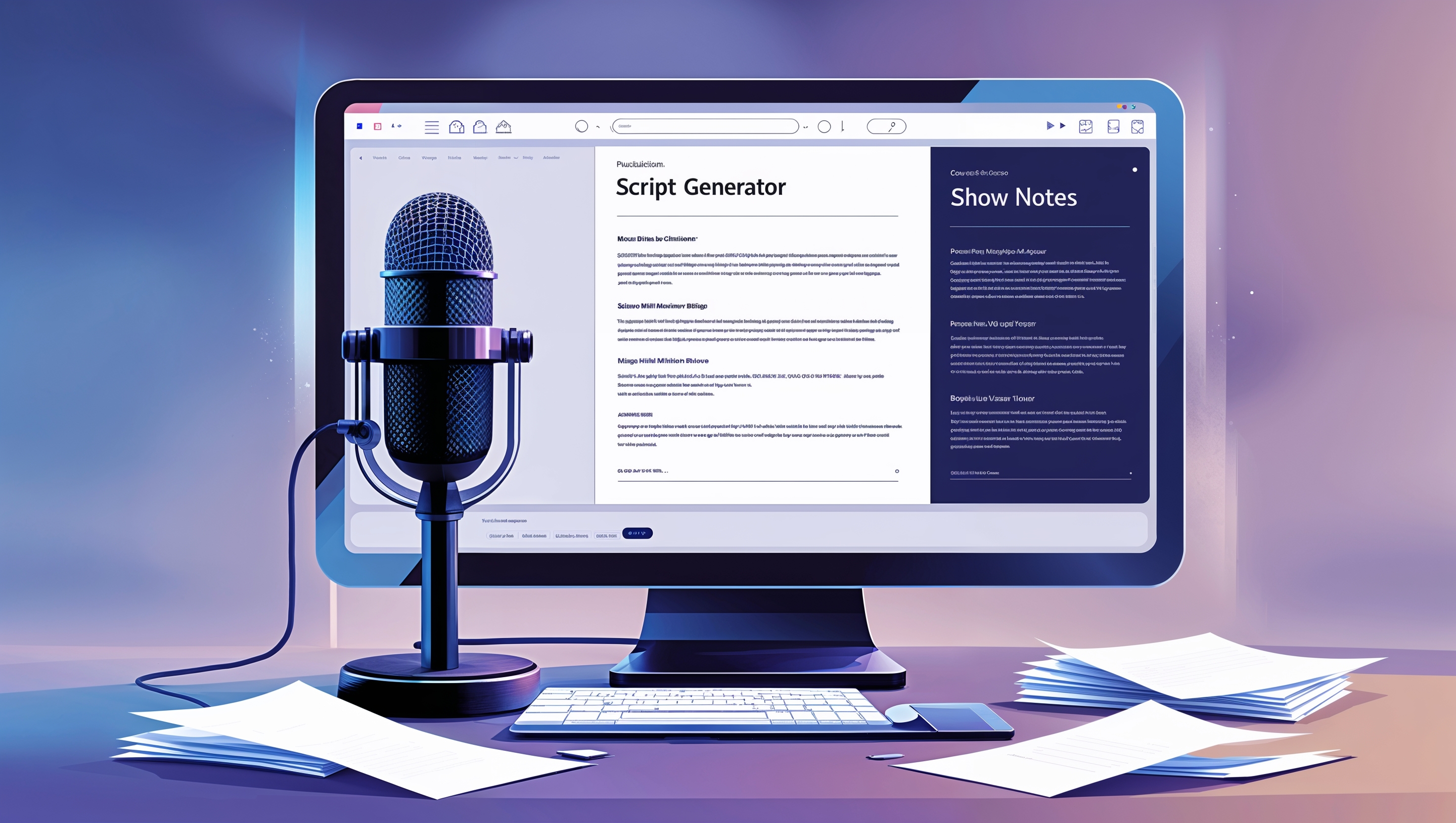15 Best AI Tools for Podcasters in 2025: From Audio Cleanup to Content Repurposing

Podcasting is no longer just a microphone and a good story — it’s now a data-driven, AI-enhanced production powerhouse.
As someone who's helped dozens of creators streamline their workflows, I can confidently say that AI tools for podcasters are revolutionizing the game.
From AI podcast editing software to advanced voice enhancement tools, creators are saving hours in post-production while improving quality.
Need instant podcast transcription or want to generate SEO-rich show notes? There’s an AI for that too.
What excites me most is the rise of AI podcast content repurposing tools — converting your audio into blogs, newsletters, or social videos in minutes.
Whether you're a solo podcaster or part of a production team, these tools aren't just optional anymore — they’re essential for growth and consistency.
In this article, I’ll walk you through the best AI solutions available today and how they can elevate your podcast from good to exceptional.
1. Why AI Tools Are Game-Changers for Podcasters
Podcasting has come a long way from being an audio-only, one-man show to a full-fledged media production. With rising expectations for sound quality, content consistency, and multi-platform distribution, creators are turning to AI tools for podcasters to simplify workflows and save time.
The biggest reason podcasters embrace AI is automation. Manually editing audio, transcribing interviews, writing scripts, and drafting show notes can take hours—sometimes more than recording itself. But with the help of AI podcast editing software like Descript or Adobe Podcast AI, creators can clean up audio and remove filler words with a few clicks.
AI is also enhancing accessibility and discoverability. Tools like Otter.ai or Whisper generate near-instant, searchable transcriptions—making it easy to repurpose your episodes into blog posts or searchable web pages. Add in AI podcast show notes generators, and suddenly your episode description, timestamps, and links are done within seconds.
Another key benefit is consistency. Whether it’s matching your tone or automatically creating content summaries, AI ensures your content meets a standard without micromanagement. AI-powered podcast production platforms like Castmagic and Swell AI go a step further by organizing all assets, clips, and SEO metadata in one place.
For solo podcasters or lean teams, this means focusing more on content and less on logistics. I’ve worked with podcasters who’ve cut their production time by 50% just by introducing 2–3 of these tools into their weekly routine.
In short, AI isn’t here to replace creativity—it’s here to support it. When used wisely, these tools transform podcasting into a smoother, smarter process from recording to release.
2. Best AI Podcast Editing Software for 2025

Editing is one of the most time-consuming parts of podcast production. AI makes this easier by automating noise reduction, filler removal, and voice leveling in minutes.
Descript is a standout. It transcribes your audio and lets you edit the sound just by deleting text—ideal for beginners.
Adobe Podcast AI enhances voice clarity, removes background noise, and normalizes audio levels automatically.
Cleanvoice AI focuses on filler word detection and multitrack cleanup, supporting podcasts in multiple languages.
Auphonic offers intelligent post-production: it adjusts loudness, removes hum, and supports batch processing.
These tools save time and create polished, professional-sounding episodes.
AI tools also support:
- Auto-transcription and timestamping
- Loudness leveling to broadcast standards
- Automatic filler word removal (uh, um, like)
- Multitrack editing support for interviews
These platforms often include free versions or trials.
Riverside.fm, though primarily a recording platform, now integrates AI editing as well.
Another strong option is Podcastle, which includes Magic Dust audio enhancement and text-based editing.
AI editing tools are ideal for:
- Solo podcasters who don’t want to hire an editor
- Agencies handling multiple shows per week
- Non-technical users seeking pro-level results
They also help:
- Reduce post-production time
- Improve clarity and listener experience
- Simplify the handoff between editors and producers
In short, AI tools let creators focus on content, not cleanup.
3. AI Tools to Transcribe and Summarize Podcasts
One of the smartest uses of AI in podcasting is transcription and summarization. With accurate transcripts, podcasters can create accessible content, repurpose material, and optimize SEO—without spending hours typing.
Otter.ai remains a favorite for its real-time transcription, speaker recognition, and seamless syncing with Zoom and other platforms. It’s especially useful for interview-style podcasts.
Whisper by OpenAI is known for its high transcription accuracy in multiple languages. It’s open-source, which appeals to tech-savvy podcasters or developers building custom workflows.
Another useful tool is Sonix.ai, which provides interactive transcripts, timestamp editing, and export-ready formats. This platform is great for teams managing multiple podcasts or needing collaboration features.
Summarization tools like Castmagic and Swell AI take transcripts and generate titles, timestamps, show notes, and even social captions. These tools are perfect for creators aiming to streamline post-production.
The most effective workflows I’ve seen pair transcription with summarization to:
- Create searchable show archives
- Improve content accessibility
- Generate YouTube subtitles and blog-ready copy
- Repurpose podcast content for emails, carousels, or reels
Whether you’re managing a personal podcast or running a branded series, AI transcription tools help you get more mileage out of your content while maintaining accuracy and efficiency.
4. Best AI Podcast Script & Show Notes Generators

Crafting engaging intros, structured show flows, and detailed show notes can be time-consuming. This is where AI podcast script generators and show notes tools become indispensable for podcasters aiming for efficiency and polish.
Tools like Jasper AI and ChatGPT have become go-to options for scriptwriting. With just a prompt, they can generate topic introductions, engaging transitions, and even detailed outlines tailored to different podcast styles. Jasper offers templates for podcast episodes, while ChatGPT lets you customize tone and structure extensively.
For show notes, Castmagic and Podium automatically generate timestamps, summaries, and guest highlights from your uploaded audio. These tools are particularly helpful for those juggling multiple episodes or publishing weekly shows on a deadline.
Using AI for scripting helps:
- Maintain tone and pacing across episodes
- Avoid creative blocks or repetitive openings
- Draft detailed episode outlines or interview questions
- Ensure content structure before hitting record
Meanwhile, AI-generated show notes:
- Improve SEO and discovery
- Provide value for listeners who prefer summaries
- Support cross-platform distribution (YouTube, newsletters, etc.)
Tools like Swell AI also support call-to-action generation and keyword tagging for better visibility.
Whether you’re a beginner looking for structure or a seasoned host aiming to save time, these script and note generators can elevate your podcast’s professionalism without added effort.
5. AI Tools for Podcast Content Repurposing
Repurposing audio into blogs, videos, or social content is one of the most impactful uses of AI tools for podcasters. It saves time, boosts reach, and ensures consistent messaging across platforms.
Repurpose.io is a favorite for automating this workflow. It takes your podcast episodes and slices them into audiograms, vertical videos, and teaser clips for social media.
Castmagic not only creates show notes but also turns podcast transcripts into tweet threads, LinkedIn posts, and even newsletter intros.
Swell AI excels at transforming long-form conversations into blog-ready summaries or highlight reels. It supports Google Docs exports and integrates with Notion for team collaboration.
Pictory, while mostly known for video generation, allows you to turn audio snippets into visual content—great for YouTube Shorts or Instagram Reels.
Benefits of repurposing with AI:
- Increases discoverability across multiple channels
- Reduces the cost and time of content creation
- Keeps your messaging aligned
- Allows podcasters to focus on voice rather than volume
In short, if you're not repurposing, you're missing half the value of each episode. These tools do the heavy lifting, helping you go from podcast to multiplatform powerhouse in minutes.
6. AI Voice Enhancement Tools for Professional Audio
Audio quality can make or break a listener’s experience, especially in a world where podcast competition is fierce. That’s why AI voice enhancement for podcasts has become a must-have, especially for creators recording remotely or without professional studios.
Tools like Adobe Enhance Speech use machine learning to improve voice clarity and remove echo and background noise. It transforms low-quality voice recordings into something that sounds like it was recorded in a studio.
Krisp.ai is widely used for real-time noise cancellation. It’s particularly helpful for interviews and co-hosted podcasts recorded on Zoom or other platforms.
Auphonic goes further by offering intelligent audio post-processing. It automatically adjusts loudness to podcast standards, levels speakers, and removes static or hiss.
Here’s a quick comparison chart:

AI voice tools also:
- Save time on manual EQing or compression
- Help beginners produce professional sound
- Reduce editing fatigue with one-click enhancement
In my experience, using any of these tools instantly improves the listener experience and reduces post-production overhead—making them invaluable for podcasters of all skill levels.
7. AI Podcast Planning & Marketing Tools
Creating a podcast is only half the challenge—getting people to find and listen is the other. Fortunately, AI-powered podcast planning and marketing tools help with both.
Podcastle and Notion AI assist with content ideation, episode planning, and outlining show formats. They’re particularly helpful for batch-planning episodes or developing themed series.
For marketing, Castmagic and FeedHive generate SEO-rich titles, episode descriptions, hashtags, and even full social media posts. You can also automate newsletter content based on new episodes.
CoHost AI offers podcast audience analytics powered by AI, helping creators understand listener behavior and refine their distribution strategy.
Here’s what AI planning and marketing tools can do:
- Suggest viral titles and hooks
- Write metadata to improve podcast SEO
- Draft newsletter blurbs and social captions
- Track which content drives listener engagement
These tools are essential for podcasters aiming to grow their audience consistently without spending hours on promotion.
8. AI Tools for Podcast SEO & Metadata Optimization

Search engine visibility is critical for podcast growth, and AI tools for podcasters can drastically improve how episodes rank on platforms like Spotify, Apple Podcasts, and Google.
Castmagic and CoHost AI lead the pack when it comes to generating podcast titles, descriptions, and keyword tags automatically. They analyze the audio content and propose metadata that’s both SEO-friendly and audience-optimized.
SEO.ai and Jasper AI are particularly helpful if you want to write longer-form content—like blog posts that embed your episodes. These tools can reverse-engineer your podcast topics into structured web copy.
FeedHive adds automation by posting metadata-rich episode descriptions and snippets to your social platforms.
Benefits of using AI for podcast SEO:
- Automatically includes trending keywords
- Boosts discoverability in search and podcast directories
- Generates optimized, readable summaries
- Enhances metadata consistency across platforms
I’ve worked with creators who doubled their podcast traffic by simply improving their titles and episode descriptions with the help of AI. Whether you’re publishing weekly or monthly, these tools help ensure your content performs long after it goes live.
9. Final Thoughts: Are AI Tools Worth It for Podcasters in 2025?
In my experience, the answer is a confident yes—AI tools for podcasters are not just worth it, they’re redefining what's possible for creators with limited time, teams, or budgets.
From voice enhancement and editing to show notes, SEO, and marketing, AI delivers professional results without requiring professional expertise.
It empowers beginners to produce high-quality episodes and allows experienced podcasters to scale faster.
AI won’t replace your voice, style, or creativity. But it will automate everything that gets in the way of sharing your voice.
The best results come from combining AI's speed and structure with your unique storytelling and listener insights.
Start small—use AI for transcription or episode outlines. Then expand to repurposing, SEO, and social promotion once your workflow is smooth.
In 2025, skipping AI as a podcaster means working harder than you need to—and falling behind those who use it to create, publish, and grow smarter.
FAQs
1. What is the best AI tool for podcast editing?
Descript and Adobe Podcast AI are top picks for their accuracy, ease of use, and voice enhancement features.
2. Can AI tools write full podcast scripts?
Yes. Jasper, ChatGPT, and Castmagic can generate intros, questions, episode flows, and even full-length scripts.
3. Are there free AI tools for podcasters?
Yes. Tools like Krisp, Auphonic, and Otter.ai offer free plans with limited features—great for beginners.
4. How can I use AI to promote my podcast?
Use tools like Repurpose.io, FeedHive, and Swell AI to create social snippets, blog posts, and SEO-optimized descriptions automatically.
